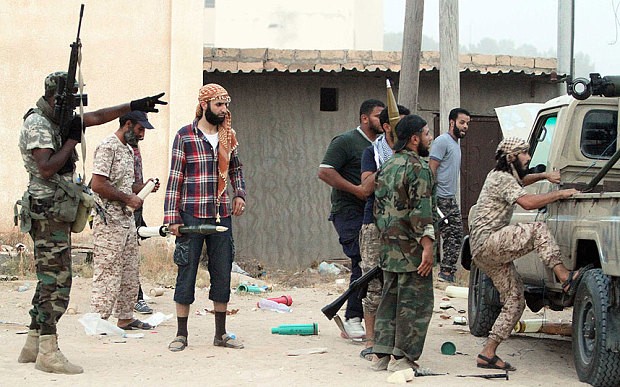UK’s Ambassador: Central Bank of Libya fueled civil war by paying salaries to rivals alike

Libya’s central bank has fuelled the civil war by continuing to pay state salaries to all the country’s myriad warring militias, Britain’s ambassador to Tripoli said on Monday.
Five years on the uprising that overthrew Colonel Muammar Gaddafi, the country is in a state of meltdown thanks to constant in-fighting among its different armed factions – who are all still on the government payroll.
Peter Millett, Britain’s ambassador to Libya, told a Lords hearing on Monday that the number of gunmen had multiplied since the end of the war because of the Libyan central bank’s policy – which began after militiamen threatened the minister of finance at gunpoint.
“There is a real problem with the proliferation of militias,” he said. “The fact is that all main militias are still paid for by the central bank. Bored young men can join a militia, then they have a salary and something to do.”
Asked why the central bank was continuing to fund all the different militias – including factions who are at each others’ throats – Mr Millett said: “I am told that in 2012, a gun was held to the minister of finance’s head and he was told ‘sign that cheque’. They were told that the easiest thing was simply to buy off the militias.”
As a result, he said, Libya was now in an “unsustainable” state, with nearly two years of chaos wrought by factional fighting and the rise of the Islamic State in the ensuing chaos.
Estimates of the number of men-at-arms in Libya have gone from around 30,000 at the time of the anti-Gaddafi revolution to as high as 140,000 now. Far from keeping the country safe, many are involved in extortion, kidnapping, people smuggling and racketeering.
Mr Millett added that ending the “huge expansion” of gunmen was now a real challenge for the country’s new unity government, which will be reliant on militias in Tripoli to both protect its ministers and refrain from attacking it.
“Can you wean these militias off the drug of regular payments?” he asked. “If we get to the situation where the majority of militias say that they will protect the government, then those that pledge to protect them will continue to be paid.
“However, those that don’t agree to protect the government will not be paid. It is quite a difficult decision because it risks civil war, and we don’t want that.”
He said that the solution was to have a gradual demobilisation scheme, whereby militiamen could be encouraged to take up alternative jobs. But he queried how attractive a proposition that would be.
“It is quite attractive to have a salary and carry a gun and so very little,” he said. “Learning to be a brick layer is not quite as attractive.”
Mr Millett was speaking at a special Libya session of the All Party Parliamentary Group on Foreign Affairs, convened to discuss the growing chaos in the country and the increasing threat it faces from the Islamic State, which has carved out a new “caliphate” in Colonel Gaddafi’s home city of Sirte.
Diplomats are now pinning their hopes a new unity government formed last month, after more than a year of often fractious talks brokered by the United Nations. Hardliners in Libya’s two main political factions oppose it, even though it is widely acknowledged that a united front is now needed to deal with the mutual threat from Isil.
Britain has also offered to provide up to 1,000 troops as part of a 6,000-strong Italian-led training mission to improve the capabilities of the Libyan security forces in their fight against Isil, but will only send them if they have a formal invite from the new Libyan government.
A more immediate problem, however, is whether the new government can even set up shop safely in Tripoli, which is home to a number of rival militias, at least some of whom will be needed to give the new authority armed back-up. “If the new government can’t go to Tripoli, the capital city, I don’t think it will have much credibility,” Mr Millett said.
He added that Libya was likely to “collapse” if the new government did not request foreign military help, as the West was unwilling to tackle Isis in Libya without backing from the Libyan government.
“If you do not have a government, what can do about Isil? I do not think we have an answer. If the whole thing collapses we will be into a very difficult situation it will be difficult to deal with Isil withut a formal request from the Libyan government.”
How to submit an Op-Ed: Libyan Express accepts opinion articles on a wide range of topics. Submissions may be sent to oped@libyanexpress.com. Please include ‘Op-Ed’ in the subject line.
- Libya needs to double POS terminals despite digital boom - January 13, 2025
- UN sets out new committee plan for Libya electoral path - January 13, 2025
- Tunisia’s Job Market: 22% AI Shift by 2025 - January 13, 2025


